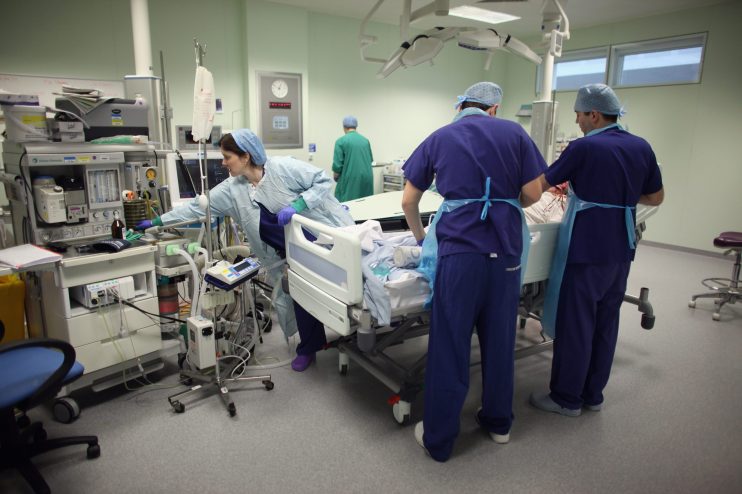Crisis has taught leaders the value of compassion

With more pressure on our political system than ever, we must not forget what really counts – our compassion and soft power.
In a matter of weeks, all our lives have been transformed in ways that we never thought we would accept: our freedoms limited, our employment insecure, our children temporarily uneducated and our bank balances precarious. As individuals, we find ourselves exposed to the whims of politicians, bosses and bank managers who we may not always support, trust or even believe. What we need those leaders to demonstrate now more than ever is compassion.
Of course, when we talk about compassion in the context of Covid-19, it would be entirely remiss not to begin with a recognition of the most compassionate members of our society: those NHS workers and social care staff who put their own lives on the line every day to secure the health of our most vulnerable. As the death toll from the killer virus continues to rise, the importance of following government guidelines cannot surely be lost on any of us.
If we stick together and help each other, we will all emerge stronger. It is heartening to see the opposition parties working in the national interest and, for the most part, steadfastly avoiding political point-scoring; the public has no appetite for such behaviour when it is scientists and not politicians that need to dictate the answers.
Journalists play a critical role in a free society, but they lose support when they act in an unnecessarily combative fashion. We want them to probe; we also want them to allow our elected officials and our scientific advisors (who are among the best in the world) to answer the questions. When Piers Morgan speaks to Health Secretary Matt Hancock as if he is playing games rather than working every hour of the day and night doing his best to protect our wellbeing, he does himself and the rest of us a disservice.
Most law-abiding citizens appreciate the government’s daily news briefings but are totally appalled by some of the questions from journalists, who think that they know everything better.
The media has an important part to play during this time of national unity and should be encouraged to behave more responsibly. Furthermore, newspapers and columnists who take pot-shots – often to their own advantage – can hardly be said to be helping either hold power to account nor doing much to inform the public. Efforts such as these give no consideration to the mental health of the frightened families at home, suffering constant news and little reassurance. We need our politicians to speak to us like grown-ups and our media to behave much more compassionately.
Business leaders have come in for their own scathing attacks. Sir Richard Branson has received so much negative press comment that he was driven recently to publish an open letter to his employees, rebutting many of the unfair criticisms that have been written, expressing his pride in his staff, and giving a little insight into all the efforts he is making to look after his 70,000 workers in 35 countries around the world.
Lord Bilimoria, a crossbench peer, Chairman of Cobra Beer and Vice President of the Confederation of British Industry, hit the right note when he appeared on BBC Question Time. While effusive in his praise for the government’s efforts, he talked about the ‘living nightmare’ business is currently working through and spoke of the Coronavirus Business Interruption Loans scheme for small businesses not working as well as it should. He said 300,000 businesses have applied for loans and only 6,000 received them, suggesting the government should provide 100% guarantees instead of the current 80%. His heartfelt plea struck a chord and I get the sense it was heard; the minister on the programme, Justice Secretary Robert Buckland, took note.
The banks, of course, have a role to play too, and are not showing the compassion we would like them to show to the nation’s SMEs. Reading a newspaper last week, I saw many bank adverts, making promises of help. But we know the loans are not getting through. While advertising rates may have come down, would it not be better if the banks devoted their resources to really supporting the businesses that they purportedly care so much about, rather than focusing on their own business perception?
Going back to 2008, then Governor of the Bank of England Mervyn King believed small businesses would get the country out of the global financial crisis, and he was proved right. Ten years from now, we will look back and see it was again the SMEs that drove growth, took on more staff and prospered, but that part of the business community is currently hurting. I would like the banks to show them just a little more compassion.
At the end of the day, the general public knows that this killer virus could strike any one of us. We really are all in this together: working from home, looking after our own children, poring over our finances, struggling with uncertainty and focusing on one day at a time.
Let us not feed on other people’s suffering; let us not pick fights that do not need picking. There will be plenty of time for review once the immediate crisis has passed.
We are showing great compassion for the NHS and other key workers – now let us try and spread that compassion a bit farther.